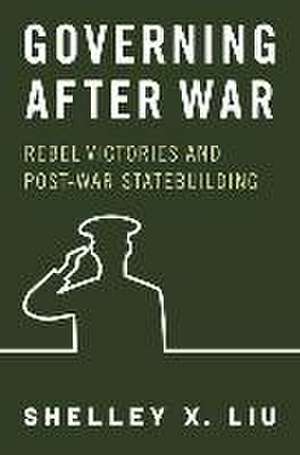Governing After War: Rebel Victories and Post-war Statebuilding
Autor Shelley X. Liuen Limba Engleză Paperback – 19 iun 2024
| Toate formatele și edițiile | Preț | Express |
|---|---|---|
| Paperback (1) | 134.95 lei 11-16 zile | +34.61 lei 7-13 zile |
| Oxford University Press – 19 iun 2024 | 134.95 lei 11-16 zile | +34.61 lei 7-13 zile |
| Hardback (1) | 403.31 lei 11-16 zile | +77.88 lei 7-13 zile |
| Oxford University Press – 25 mar 2024 | 403.31 lei 11-16 zile | +77.88 lei 7-13 zile |
Preț: 134.95 lei
Preț vechi: 154.73 lei
-13% Nou
Puncte Express: 202
Preț estimativ în valută:
25.83€ • 26.93$ • 21.46£
25.83€ • 26.93$ • 21.46£
Carte disponibilă
Livrare economică 17-22 februarie
Livrare express 13-19 februarie pentru 44.60 lei
Preluare comenzi: 021 569.72.76
Specificații
ISBN-13: 9780197696712
ISBN-10: 0197696716
Pagini: 352
Dimensiuni: 229 x 147 x 25 mm
Greutate: 0.39 kg
Editura: Oxford University Press
Colecția OUP USA
Locul publicării:New York, United States
ISBN-10: 0197696716
Pagini: 352
Dimensiuni: 229 x 147 x 25 mm
Greutate: 0.39 kg
Editura: Oxford University Press
Colecția OUP USA
Locul publicării:New York, United States
Recenzii
Governing after War is a quantum leap forward in scholarship on post-war politics. Liu does a marvelous job analyzing the political tradeoffs and intense threats that post-war states face, and she develops a counterintuitive theory about how rebel victors balance security and development priorities based on wartime ties with civilians. The multi-method data collection in the two main cases of Zimbabwe and Liberia is creative and rigorous, and the empirics are further supported by an original analysis of four other African countries. Anyone interested in post-war peace building, civil war dynamics, rebel governance, and African politics should read this book.
How do rebel victors of civil wars allocate development and coercive resources after winning control of the state? This penetrating analysis of Zimbabwe and Liberia provides an important answer: ties to civilians during wartime guide rebels' ability to consolidate power and prevent violence recurrence in war's aftermath. Providing the critical link between rebel governance and state building, the book is a must read for scholars of postwar politics.
Fundamental to politics is the state, its capacity, and how political actors consolidate control over its institutions. In Governing After War, Shelley Liu compellingly explains sub-national variation in how rebel victors exert and expand state control once conflict is over. Liu argues that rebel victors leverage institutions and civilian connections forged during war to direct resources to key constituencies in ways that reduce the likelihood of conflict recurrence. Artfully weaving quantitative and qualitative evidence, Liu's pioneering work bridges war-time governance with post-war state-building, making it a must-read for scholars in both fields.
A tremendous advance in the study of post-war politics, Liu offers an insightful and compelling analysis of how rebel victories produce distinct political behaviors. Eschewing the tendency to view statebuilding as unfolding upon a blank canvas, Liu instead shows how behaviors forged amidst the fighting can shape the behavior of the new regime. Combining sophisticated and often surprising logics with extensive ethnographic and other evidence, Liu's contribution is sure to make a mark in the wider fields of conflict resolution and statebuilding.
How do rebel victors of civil wars allocate development and coercive resources after winning control of the state? This penetrating analysis of Zimbabwe and Liberia provides an important answer: ties to civilians during wartime guide rebels' ability to consolidate power and prevent violence recurrence in war's aftermath. Providing the critical link between rebel governance and state building, the book is a must read for scholars of postwar politics.
Fundamental to politics is the state, its capacity, and how political actors consolidate control over its institutions. In Governing After War, Shelley Liu compellingly explains sub-national variation in how rebel victors exert and expand state control once conflict is over. Liu argues that rebel victors leverage institutions and civilian connections forged during war to direct resources to key constituencies in ways that reduce the likelihood of conflict recurrence. Artfully weaving quantitative and qualitative evidence, Liu's pioneering work bridges war-time governance with post-war state-building, making it a must-read for scholars in both fields.
A tremendous advance in the study of post-war politics, Liu offers an insightful and compelling analysis of how rebel victories produce distinct political behaviors. Eschewing the tendency to view statebuilding as unfolding upon a blank canvas, Liu instead shows how behaviors forged amidst the fighting can shape the behavior of the new regime. Combining sophisticated and often surprising logics with extensive ethnographic and other evidence, Liu's contribution is sure to make a mark in the wider fields of conflict resolution and statebuilding.
Notă biografică
Shelley Liu is Assistant Professor of Public Policy at Duke University. Her research examines how citizens relate to the state, and how these citizen-state relationships affect post-conflict development and state-building in developing contexts. Her scholarship has been published in the American Journal of Political Science, World Politics, Journal of Peace Research, Politics & Society, and PLOS ONE.
